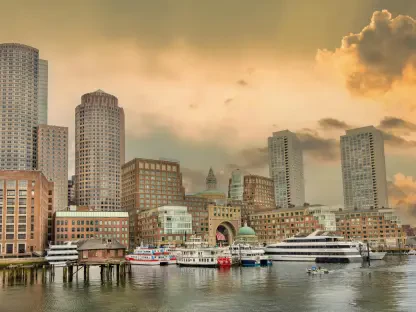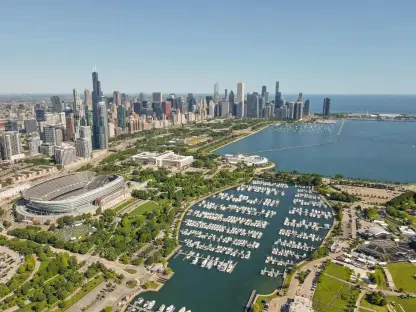In a world increasingly focused on combating climate change, major corporations are stepping up with bold initiatives to reduce their environmental impact, and Northern Ireland is emerging as a surprising yet significant player in this global effort. Amazon, a leader in logistics and technology, has recently announced a groundbreaking project at its delivery hub in Belfast’s Titanic Quarter, aiming to expand its electric vehicle (EV) infrastructure. This development signals a strong commitment to sustainability, aligning with broader goals of achieving net-zero carbon emissions. By building substations for EV chargers, the company is paving the way for a greener delivery fleet in the region, positioning Belfast as a key hub in the transition to zero-emission logistics. Beyond this corporate stride, Northern Ireland’s business landscape is teeming with innovation, from local startups gaining international traction to unique ventures blending cultural heritage with modern enterprise. This vibrant mix of global influence and grassroots dynamism offers a compelling narrative of progress, where sustainability and economic growth intersect in meaningful ways.
The implications of such initiatives extend far beyond a single company’s operations. They reflect a growing trend of environmental responsibility that resonates with businesses of all sizes in the area. Alongside this, technological advancements and evolving business models are reshaping how enterprises operate, fostering a sense of resilience and adaptability. From small family-run firms to niche tourism projects, the region showcases a diverse economic fabric that complements larger sustainability efforts. This multifaceted approach to growth, paired with a rising emphasis on social responsibility, underscores Northern Ireland’s potential to lead by example in balancing profit with purpose.
Corporate Commitment to Green Logistics
Electrifying Delivery Operations in Belfast
Amazon’s latest project in Belfast marks a pivotal moment in the push for sustainable logistics within Northern Ireland. By constructing specialized substations for EV chargers at its Titanic Quarter hub, the company is laying the groundwork to support an expanding fleet of zero-emission delivery vehicles. This infrastructure is not merely a technical upgrade but a deliberate step toward reducing carbon emissions in line with global environmental targets. The focus on electrification highlights how major corporations can influence regional practices by integrating green technologies into everyday operations. While specific details about the scale of the project remain undisclosed, the intent to bolster a growing EV fleet suggests a long-term vision for transforming logistics in the area. This initiative also serves as a catalyst for other businesses to explore similar paths, potentially sparking a wider adoption of sustainable practices across the sector.
The impact of this development extends to the broader community, as it positions Belfast as a forward-thinking hub in the logistics industry. The move aligns with international trends where companies are increasingly held accountable for their environmental footprint, prompting shifts toward cleaner energy solutions. By investing in such infrastructure, Amazon is not only addressing operational needs but also contributing to the region’s reputation as a participant in the global sustainability movement. This could encourage partnerships with local authorities and businesses to further enhance green initiatives, creating a ripple effect of positive change. The project stands as a testament to how targeted investments in technology can drive significant progress in environmental stewardship.
Regional Implications of Sustainable Practices
The establishment of EV charger infrastructure by Amazon in Belfast carries implications that resonate beyond corporate boundaries, influencing the regional approach to sustainability. This project underscores the importance of integrating eco-friendly solutions into urban planning and business strategies, potentially inspiring local policymakers to prioritize green policies. Northern Ireland, with its unique blend of urban and rural landscapes, stands to benefit from such initiatives by reducing pollution and promoting cleaner air quality in densely populated areas like Belfast. The emphasis on zero-emission vehicles could also stimulate demand for related industries, such as renewable energy providers and EV maintenance services, fostering economic opportunities tied to sustainability.
Moreover, this initiative highlights the role of large corporations in setting benchmarks for environmental responsibility that smaller enterprises might emulate. As global attention on climate change intensifies, businesses in the region may feel compelled to adopt similar technologies or practices to remain competitive and relevant. The presence of such infrastructure could also attract environmentally conscious investors, further boosting the local economy. By showcasing a commitment to green logistics, Belfast is carving out a niche as a progressive area willing to adapt to modern challenges. This development serves as a reminder that sustainability is not just a corporate buzzword but a practical pathway to long-term economic and environmental health.
Innovation and Economic Growth in Northern Ireland
Pioneering Technology from Belfast Startups
Northern Ireland is rapidly gaining recognition as a hotbed for technological innovation, with Belfast-based startups like Neurovalens leading the charge in cutting-edge fields. This neurotech company has recently secured substantial funding to expand its reach into global healthcare markets, focusing on medical devices that address conditions such as insomnia and anxiety through neuroscience. The success of such enterprises illustrates the region’s capacity to produce world-class solutions that rival those from larger tech hubs. By harnessing local talent and attracting investment, startups like Neurovalens are proving that innovation can thrive outside traditional centers of industry, contributing significantly to economic vitality and international prestige.
This surge in technological advancement complements larger corporate efforts, creating a dynamic ecosystem where ideas and resources flow between different scales of business. The achievements of local startups provide a counterbalance to initiatives by giants like Amazon, showing that innovation is not solely the domain of multinational corporations. Instead, it emerges from grassroots efforts that leverage unique regional strengths. This trend also signals to potential investors and policymakers that Northern Ireland offers fertile ground for tech-driven growth, potentially leading to increased support for incubators and research facilities. The blend of local ingenuity with global aspirations positions the area as a compelling destination for future-focused enterprises.
Shifting Toward Employee-Centric Business Models
A transformative trend gaining momentum in Northern Ireland is the adoption of Employee Ownership Trusts (EOTs), as exemplified by firms like SCC in Holywood. This model transfers ownership to employees, fostering a sense of shared purpose and accountability that can enhance productivity and morale. By prioritizing worker engagement, businesses adopting EOTs are redefining success in ways that extend beyond profit margins, focusing instead on long-term stability and community impact. This shift reflects a broader movement toward inclusive practices that value stakeholders at every level, aligning with modern expectations for ethical corporate behavior.
The rise of EOTs in the region offers a fresh perspective on how businesses can operate sustainably in a competitive landscape. Unlike traditional ownership structures, this approach encourages employees to take an active role in decision-making, potentially leading to more innovative and responsive strategies. It also addresses challenges like staff retention, which is critical in a market where talent is highly sought after. As more companies explore this model, Northern Ireland could become a leader in demonstrating how employee-centric frameworks contribute to economic resilience. This trend underscores a growing recognition that empowering individuals within a business can yield benefits that ripple outward, strengthening the entire economic fabric of the region.
Local Enterprises and Cultural Contributions
Strength and Adaptability of Family Businesses
Small and medium enterprises (SMEs) form the backbone of Northern Ireland’s economy, with family-run businesses like Brick and Stone offering powerful examples of resilience. Leaders such as Tory Agnew, who has navigated the complexities of managing a family brick business for decades, embody the determination required to thrive amid economic fluctuations. Their stories reveal the unique challenges of balancing tradition with the demands of a modern marketplace, often prioritizing hands-on experience over formal structures. These enterprises contribute not only through job creation but also by preserving local heritage and fostering community ties, which are vital for sustained economic health.
The adaptability of such businesses is evident in their ability to evolve while maintaining core values, a trait that sets them apart in a rapidly changing world. Many family-run firms in the region have weathered significant obstacles by leveraging close-knit relationships and a deep understanding of local needs. This agility allows them to pivot quickly in response to market shifts, ensuring their relevance over generations. Their presence adds a layer of stability to the economy, complementing larger corporate initiatives by grounding progress in community-focused efforts. As these SMEs continue to innovate within their niches, they play an indispensable role in weaving a diverse and robust economic tapestry across Northern Ireland.
Cultural Ventures Enhancing Economic Diversity
Unique ventures, such as Ireland’s first whiskey hotel in Carnlough, highlight how cultural heritage can intersect with modern business to drive economic diversity in Northern Ireland. By blending tourism with a celebration of local traditions, this project taps into a growing demand for authentic experiences that resonate with visitors seeking more than just a destination. Such initiatives not only boost local revenue but also elevate the region’s profile as a place rich in history and innovation, attracting a wide range of travelers and investors. This fusion of culture and commerce showcases how niche markets can contribute to broader economic goals.
Beyond their immediate financial impact, these cultural enterprises foster a sense of pride and identity that strengthens community bonds. They offer a platform for storytelling through business, preserving narratives that might otherwise fade in the face of globalization. Projects like the whiskey hotel also create opportunities for collaboration with other local businesses, from suppliers to artisans, creating a multiplier effect that benefits the wider economy. As Northern Ireland continues to nurture such distinctive ventures, it builds a reputation for creativity and hospitality, aligning with sustainability principles by promoting mindful tourism. This approach enriches the region’s economic landscape, ensuring that growth is both inclusive and reflective of its unique character.
Social Responsibility and Inclusive Growth
Embedding Ethical Practices in Business Strategy
Corporate social responsibility (CSR) is increasingly viewed as a fundamental aspect of business strategy in Northern Ireland, with thought leaders like Maeve Hunt of Grant Thornton advocating for its adoption across all enterprise sizes. This perspective emphasizes that ethical practices are no longer optional but essential for building trust and enhancing reputation in a socially conscious market. By integrating CSR into their operations, companies can address societal challenges while differentiating themselves from competitors. This trend aligns closely with sustainability efforts, as seen in major projects focused on reducing environmental impact, creating a cohesive framework for responsible growth.
The push for CSR reflects a broader shift in expectations, where consumers and stakeholders demand transparency and accountability from businesses. In Northern Ireland, this movement is gaining traction as firms recognize the value of contributing to community well-being, whether through environmental initiatives or social programs. Such efforts can lead to tangible benefits, including stronger customer loyalty and improved employee satisfaction. By championing CSR, businesses in the region are not only responding to global pressures but also shaping a local culture of responsibility that could set a precedent for others. This focus on ethical conduct offers a pathway to sustainable success that benefits both enterprises and the communities they serve.
Fostering a Future-Ready Economic Framework
Advocates like Norman Sterritt of Triangle Housing Association are calling for a renewed focus on investing in people to build a more inclusive, future-ready economy in Northern Ireland. This vision prioritizes human capital as the cornerstone of sustainable development, ensuring that economic growth does not come at the expense of social equity. By emphasizing education, training, and support systems, the region can prepare its workforce for emerging industries and technological advancements. This approach dovetails with broader sustainability goals, as it seeks to create opportunities that uplift entire communities, mirroring the ethos behind environmentally conscious projects.
The drive for inclusivity also addresses systemic challenges that could hinder long-term progress if left unchecked. Creating pathways for diverse participation in the economy ensures that benefits are widely shared, reducing disparities and fostering resilience. This perspective encourages collaboration between businesses, government, and non-profit organizations to design policies and initiatives that prioritize accessibility and fairness. As Northern Ireland navigates its place in a globalized world, such efforts to build an inclusive framework are critical for maintaining competitiveness while honoring social values. The integration of these principles with environmental and economic strategies offers a holistic model for growth that could inspire other regions to follow suit.
Reflecting on a Sustainable Legacy
Looking back, the strides made by Amazon in enhancing EV charger infrastructure at its Belfast hub marked a significant chapter in Northern Ireland’s journey toward sustainability. This project, alongside the region’s vibrant tapestry of innovation and cultural enterprise, illustrated a powerful synergy between global corporate actions and local ingenuity. The efforts of startups, family businesses, and unique ventures painted a picture of resilience that complemented larger environmental goals. Moreover, the emphasis on employee ownership and corporate social responsibility highlighted a commitment to inclusive growth that resonated deeply within the community. As these initiatives unfolded, they left behind a legacy of progress, encouraging future generations to prioritize sustainability and equity. Moving forward, the focus should remain on nurturing partnerships that amplify these achievements, ensuring that infrastructure investments and social programs continue to evolve in tandem with emerging needs. This balanced approach promises to solidify Northern Ireland’s standing as a beacon of sustainable and inclusive economic development.









